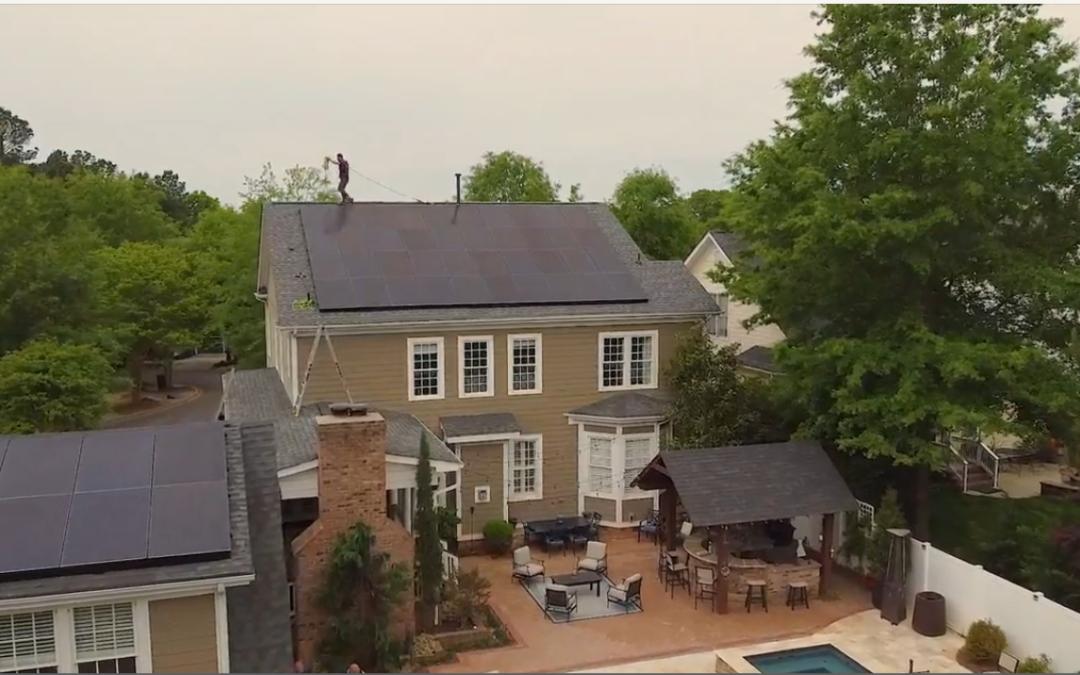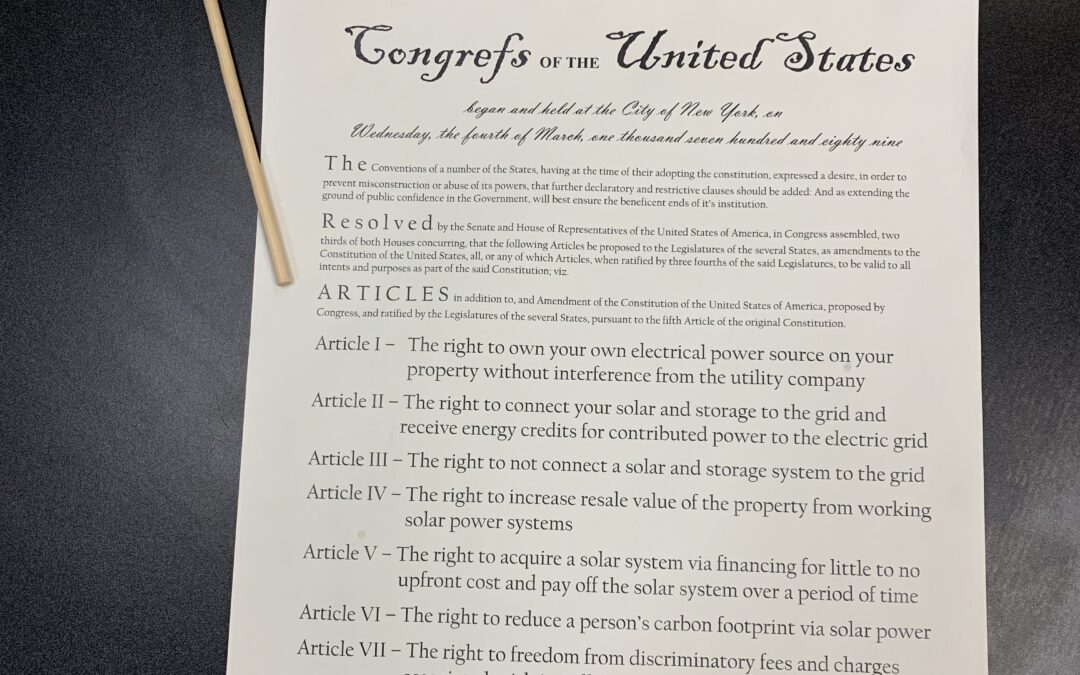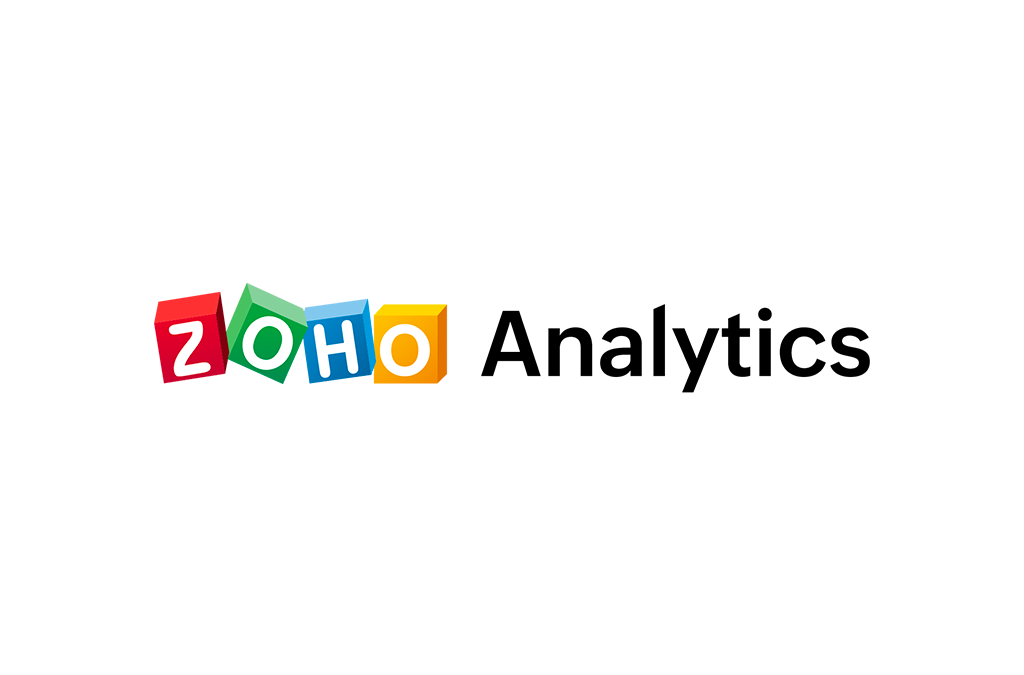
by Renu Energy | Feb 7, 2023 | Renu Blog, Residential
The Carolinas are home to sunny skies, making them an ideal location for harnessing the power of the sun. In recent years, the use of solar energy has been on the rise in both North Carolina and South Carolina. Here are some of the benefits of solar power in the Carolinas, supported by statistics.
- Clean Energy: Solar power is a clean and renewable energy source that does not produce any emissions or pollutants. In the Carolinas, the use of solar energy reduces the dependence on fossil fuels, which are a major contributor to air pollution.
- Cost Savings¹: Installing a solar power system can significantly reduce electricity costs for homeowners and businesses. According to EnergySage, the average cost of solar panels in North Carolina is $3.14 per watt, which can result in savings of thousands of dollars over the life of the system.
- Job Creation²: The solar industry is a major employer in the Carolinas, creating thousands of jobs in installation, maintenance, and management. In 2020, North Carolina ranked 8th in the nation for solar jobs, with over 8,000 workers in the industry.
- Increased Property Value³: Homes and buildings with solar power systems have been shown to have a higher resale value. A study by the National Renewable Energy Laboratory found that homes with solar panels sold for an average of 4.1% more than comparable homes without solar.
- Supports the Grid: Solar power not only reduces energy costs, but it also supports the grid by reducing the demand for energy from traditional power plants during peak hours. This helps to prevent blackouts and brownouts during hot summer months, which are a common problem in the Carolinas.
- State and Federal Incentives⁴: Both North Carolina and South Carolina offer a range of incentives to encourage the adoption of solar power, including tax credits, rebates, and grants. The Federal Investment Tax Credit (ITC) also provides a credit for 26% of the cost of a solar power system for homeowners and businesses.
Solar power in the Carolinas offers a range of benefits to homeowners, businesses, and the community as a whole. The sunny skies, cost savings, job creation, increased property value, support for the grid, and state and federal incentives make it an attractive option for those looking to transition to clean and renewable energy.
Clean Energy: The information on solar power being a clean and renewable energy source that does not produce emissions or pollutants is a widely known fact.
¹https://www.energysage.com/solar/cost/north-carolina/.
²Solar Energy Industries Association (SEIA) (https://www.seia.org/research-resources/north-carolina-solar-industry-data).
³The study by the National Renewable Energy Laboratory https://www.nrel.gov/docs/fy14osti/61669.pdf.
⁴Database of State Incentives for Renewables & Efficiency (DSIRE) (https://www.dsireusa.org/).

by Renu Energy | Feb 3, 2023 | Renu Blog, Renu Solar News
Duke’s Green Source Advantage Program
The North Carolina General Assembly implemented Duke Energy’s Green Source Advantage program (GSA) that provides customers with renewable energy options to help increase renewable energy development in the state. Customers who take advantage of the GSA include major military installations, University of North Carolina institutions, and large business customers.
100% Renewable
The newest proposal expands the GSA by allowing customers to use 100% renewable energy that pairs with energy storage units. Not only will these customers use renewable energy 24/7, but they will also receive access to up to 4,000 megawatts of power capacity. Using renewable energy projects connected to Duke Energy’s grid would offset customers’ power purchases, and count the renewable energy generated towards their sustainability goals.
GSA Proposal Changes
-
Renewable energy use increased from 30% to 100%
-
Purchases are made with Duke Energy or independent developers
-
Energy storage can combine with projects to align energy production with energy load
-
A new 10-year avoided cost bill credit option is introduced with the existing 5-year and 2-year options
Clean Energy Impact
Along with the GSA program expansion, Duke proposes another renewable program called the Clean Energy Impact. This program targets customers who aim to claim a certain percentage of renewable energy to meet sustainability goals. Renters and residential customers benefit from this program since contracts are on a month to month basis.
To read the official release on these programs from Duke Energy, click the link here!

by Renu Energy | Feb 2, 2023 | Renu Blog, Renu Solar News
Renu’s Solar Bill of Rights
As the Solar Industry continues to grow, companies of all sizes are finding different ways to reach their customers, design systems, and provide solar installation services. One thing all solar companies focus on is providing customers with the right to own clean and controllable energy. Motives for going solar range from saving money to creating clean energy. Below, Renu lists their beliefs that homeowners with solar energy should have in an ideal scenario.
Article I
The right to own your own electrical power source on your property without interference from the utility company
Article II
The right to connect your solar and storage to the grid and receive energy credits for contributed power to the electric grid
Article III
The right to not connect a solar and storage system to the grid
Article IV
The right to increase resale value of the property from working solar power systems
Article V
The right to acquire a solar system via financing for little to no upfront cost and pay off the solar system over a period of time
Article VI
The right to reduce a person’s carbon footprint via solar power
Article VII
The right to freedom from discriminatory fees and charges associated with installing solar and storage technologies
Article VIII
The right for a timely and professional installation process
Article IX
The right for professional service should it arise at any time
Article X
The right for solar education with accurate information that assists in the investment decision-making process
Let us know your solar bill of rights below!

by Renu Energy | Jan 30, 2023 | Renu Blog, Renu Solar News
Renu’s Growth
Since 2010, Renu Energy Solutions has been providing solar installations, electric vehicle chargers, and energy storage units for residential and commercial properties. From its beginning, Renu has grown immensely. Director of Operations Hannah Elliot describes Renu’s beginnings as a 25-35 employee operation to now a 100+ employee operation covering North and South Carolina. Growth like what Renu experiences requires new ways of doing business. Zoho Analytics changed the way Renu carries out projects from sales all the way to installation.
Before Zoho Analytics
Prior to Zoho Analytics’ integration to Renu’s office, project details were kept in folders, notes were kept on paper, and employees memorized customer details. Once project bandwidth increased, traditional methods of data collecting were no longer capable of keeping up. Projects take different amounts of time to complete and are constantly at different stages from one another.
Zoho Analytics’ Automation
Jeff Aliotta, CSO, emphasizes the importance of understanding the company’s improvement. “We need to know if we are getting better or worse.”, Aliotta says. While using CRM and Zoho Projects helped keep track of data, measuring the business’ health was hard without more tools. John Sheldon, Director of New Business Capabilities, realized that these tools needed to be able to “talk” with one another and generate reports. Zoho Analytics pulls data from CRM and Zoho Projects and creates reports automatically; replacing the need to make reports manually.
Another Employee In The Office
Zoho Analytics produces reports by the minute, allowing operations to make decisions fast. As Renu Energy Solutions grows, so do the number of projects. With Zoho Analytics, Renu can take these projects head on with the confidence that the necessary information is provided. Sheldon describes Zoho Analytics as “another employee in the office” that is there to assist when needed. Renu Energy Solutions recommends using Zoho Analytics in any office no matter the industry.
To read Zoho’s Case Study with Renu Energy Solutions, click here!

by Renu Energy | Jan 6, 2023 | Renu Blog, Renu Solar News
Solar Tax Credit Eligibility
One of the main perks of investing in solar for the home are the federal tax credits customers receive. The solar tax credit decreases customers’ federal income tax, and derives from a percentage of the cost of a complete solar system installation. In 2022, the federal government passed the Inflation Reduction Act which increases the percentage of costs customers receive from 26% to 30%. Eligibility for the solar tax credit includes:
- Installing and powering on a PV solar system during the tax year
- Installing the system at a customer’s primary or secondary residence
- Owning the system from purchasing with cash or financing options
- Claiming the one time tax credit on the original installation
Solar Tax Credit Expenses
The federal tax credit includes multiple expenses that associate with a PV solar system. From labor to components, the expenses add up which gives customers the incentive to choose a company that provides components and installation services. A company that helps its customers from the consultation phase to the system activation phase will be able to assist with keeping track of expenses. The list of expenses includes
- Solar Modules (Panels)
- Labor including site preparation, installation, permitting fees, inspection costs, and developer fees
- Energy conversion equipment such as wires, inverters, and mounting equipment
- Energy storage units that are paired with a PV solar system
- Sales taxes on expenses listed above
Sometimes, a customer will meet the requirements to receive the federal tax credit while having certain circumstances that differentiate them from the average customer. Each customer has their own needs when they choose to install a solar system. If a customer meets the requirements for the federal tax credit, they can receive the credit if:
- The customer isn’t a homeowner, but a tenant-stockholder at a co-op housing corp or a condominium owner
- Their vacation home is not a rental property
- Their system isn’t connected to the grid, but generates electricity for the residence
- The solar panels are on the property but not the roof
- The residence has a home office, but the majority of power is used for residential purposes
- The customer used financing rather than paying cash for the system
Once a customer receives the federal tax credit, they should understand how that tax credit can be used. For example, if a customer’s federal tax credit exceeds their tax liability, they won’t be able to get a refund. Although, any left over tax credit that hasn’t been used can be moved to the following year. Also, federal tax credit can be applied to the alternative minimum tax.
Customers can claim the tax credit by filling out IRS Form 5696 and attaching it to their federal tax return. For more information homeowners should know about the solar federal tax credit, click here to read the official guide from the U.S Department of Energy.

by Renu Energy | Oct 12, 2022 | Renu Blog
As 2022 is approaching its end, solar companies look back on their partnered installation companies and reflect on projects and sales. 2022 has been the first full year where REC’s Alpha Pure modules have been available for customers that are beginning their solar journey. Renu is a proud provider of REC Alpha Pure modules in the Carolinas for both residential and commercial customers.
Not only is Renu a proud partner with REC, we also earned REC’s Installer of the Year award for the south east in 2022! Renu has been partnered with REC for the past 2 years, and installed 10.25 MW of solar in North Carolina, South Carolina, and Georgia. Without our fantastic installation team and our valued customers for trusting us with their solar needs, receiving this award wouldn’t be possible.







